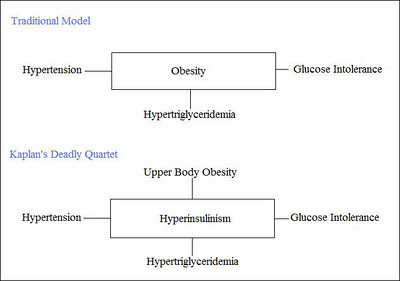Insulin is the hormone - produced by the pancreas -
that allows glucose into cells where it can be utilized as
fuel. Through bad luck (heredity) and lifestyle (mainly too much
dietary carbohydrate) your cells can become
resistant to insulin. The mechanism of this resistance
is still being studied but we know that the insulin
receptors that sit on every cell’s surface lose their
ability to function. This causes the pancreas to secrete
more insulin than is normal to get glucose inside the cell.
Though insulin is absolutely essential to life, chronic and
acute elevation of insulin wreaks havoc in the human
body. This process is known as “insulin resistance” and
the resultant condition is “hyperinsulinemia”.
The amount of research being published suggesting a
causal link between hyperinsulinism and disease is one
of the more productive and exciting arenas in modern
medicine. The expansiveness and range of diseases
whose underlying cause is hyperinsulinism has inspired
metaphors of a multi-headed monster of Greek
mythology, the Hydra, by Dr. Michael Eades, author of
Protein Power, and an iceberg with hyperinsulinemia
below the water’s surface and disease state as the peaks
by Dr. Ralph DeFronzo, a pioneering hyperinsulinemia
researcher at the University of Texas, San Antonio.
There is mounting evidence linking hyperinsulinemia to:
• Hypercholseterolemia
• Hypertriglyceridemia
• Obesity
• Hypertension
• Immune disorders
• Thrombosis and platelet aggregation
• Cellular proliferation
• Diabetes
• Heart disease
• Mood dysfunction
• Brain dysfunction
• Arthritis
• Hyper inflammatory states
• Alzheimer’s disease
• Stroke
• Osteoporosis
• Metastasis
• Angiogenesis
• Cancer
The battle is still going on between which side is right, but at present it appears that the evidence seems to be shifting in favor of lowering dietary carbohydrates for a better lifestyle. It should be noted that the response of the body to low-GI (glycemic index) carbohydrates does not produce a major insulin elevation in the body.
At The Compound our nutrition challenge, though only a week old, has already shown this improvement through many of our participants who noted they were feeling better, had more energy, etc. A few others have had quite a hard time, feeling "hungry" and at a loss as to what to eat at every meal in place of a bread, yogurt, pasta, soda, even dairy. That "hunger" sensation they were feeling many times was not hunger, but rather a craving for the elevated insulin response. It is such a huge craving, that some researchers have even compared it to "crack". The body had become so insensitive to insulin, that the only way to get a response again was to digest more insulin (through dietary carbohydrates).
Insulin sensitivity is extremely important as it tells the body which foods do what to it and, from an obesity standpoint, lets the body know its full. Disrupt the sensitivity of the receptors and the body goes haywire. I like to equate it to the odor of marijuana, which I run into quite a bit on the job (any odor will do, such as perfume). Last time my partners and I were booking a large amount of marijuana for evidence, the odor was prevalent from the moment I walked into the room. Fast forward several minutes into the booking process and the odor is not as obvious as it once was. Walk out of the room and come back in and the strong odor hits you again.
Our body naturally down-regulates our sensitivity to the marijuana just like it does insulin in our body when it is constantly bombarded with it. We become insensitive to insulin but we still have high levels within our body. Insulin is important for our bodies for fuel, but take in more insulin than we dispose of and your left with the increasingly growing number of diseases mentioned above.
The easy way to stop the over-production of insulin in the body? Ditch the grains and majority of dairy in your meals and see how you feel!


No comments:
Post a Comment